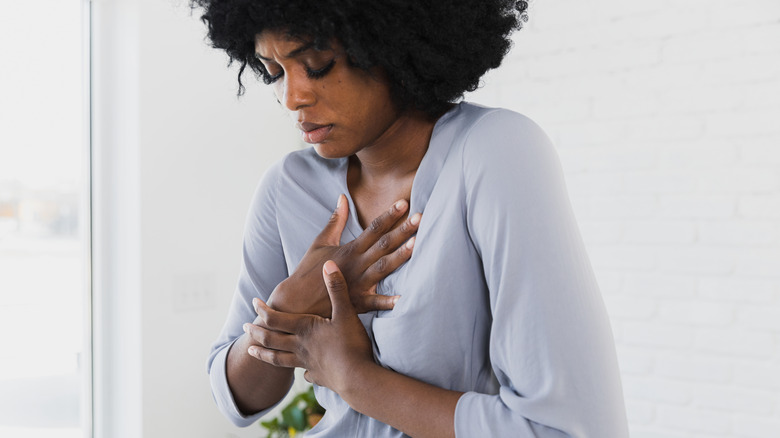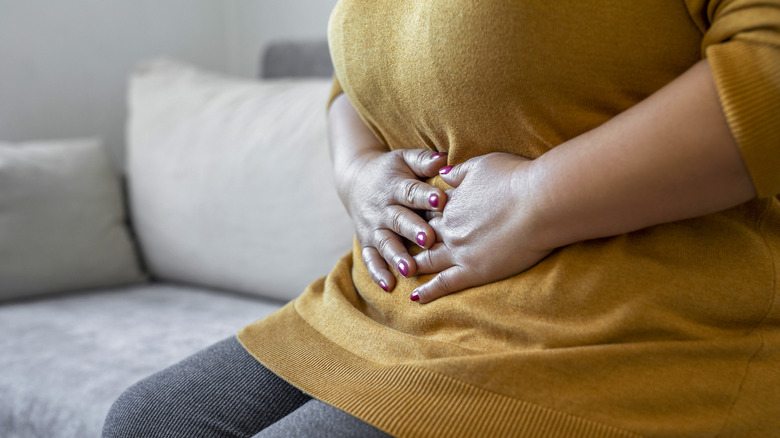What It Means When Nausea Makes You Burp
Stress, motion sickness, and hangovers can all make us feel nauseous. It's never a pleasant feeling and if you've felt it, you've probably done anything you could think of to help yourself feel better — or just sat down somewhere quietly trying not to move too much.
If your nausea is accompanied by burping, heartburn, or regurgitation, though (especially if you experience it often), you may want to get yourself checked for gastroesophageal reflux disease (GERD), according to gastroenterologist, Paul Berggreen (via Prevention).
When we eat food, it's supposed to go through our mouth, down to our throats, then our esophagus, and our stomach where stomach acids break the contents down. When you have GERD, the stomach acids (and sometimes even food particles) come back up the esophagus and throat, making you feel like you've got sour-tasting fluid and food particles in your throat and mouth. You might also feel pain and burning in your chest region because of a backwash of stomach acids.
According to gastroenterologist Dr. Jeffrey Alexander (via Mayo Clinic Radio), GERD occurs generally because of a weakness of the lower esophageal sphincter muscle. "The lower esophageal sphincter's role is to keep the acid restricted to the stomach," explained Cleveland Clinic gastroenterologist Dr. Saleem Chowdhry, per Everyday Health. When this muscle relaxes when it's not supposed to, stomach acids (and sometimes food) come back up the esophagus, causing discomfort. Do you have GERD — and when should you see a doctor for nausea and vomiting?
How to know for sure if you have GERD
Burping and having stomach acid and food come back up your throat — once in a while — is nothing to be concerned about. It's something that happens to most of us at least once in our lifetime. But if you burp, feel nauseous, and have heartburn more than twice a week for a considerable period of time, you could have GERD, according to Cleveland Clinic. You may also want to ask yourself if you've been reaching for antacids after every meal in the last few weeks.
"Heartburn is a sensation under the breast bone, of a burning feeling. Frequently it occurs after meals, sometimes it occurs after spicy foods, tomato-based foods, chocolate, spearmint, [and] peppermint. It can occur after big meals and lying down. It can occur after alcohol. That's the hallmark symptom of GERD," explained Alexander to Mayo Clinic Radio. Along with nausea, heartburn, and burping, you could also experience a sore throat, coughing, a sensation of food being stuck in your throat, regurgitation, and difficulty swallowing.
Being overweight or pregnant could also put pressure on your abdomen, causing your esophageal sphincter to relax when it shouldn't. So can lifestyle factors like overeating, lying down too quickly after big meals, smoking, and certain medications, per Healthline. Health conditions like asthma, anxiety, irritable bowel syndrome, and a hiatal hernia can also cause GERD. A hiatal hernia is a condition where part of your stomach has extended into your chest.
Is GERD serious?
Diagnosing GERD might be as simple as having a detailed clinical conversation with your gastroenterologist. It may also involve tests such as an upper endoscopy or pH testing, according to Alexander (via Mayo Clinic Radio).
If your doctor thinks you have GERD, they'll probably prescribe some medication and lifestyle changes. These may include eating smaller meals, quitting smoking, waiting three hours after meals before going to bed, and avoiding spicy foods and caffeine. "Symptoms more than two times a week and where there is concern for inflammation in the esophagus is considered moderate or severe GERD," said Chowdhry, per Everyday Health.
There are times when chronic GERD may have caused other potentially more serious problems in your GI tract, such as gastrointestinal bleeding, respiratory issues, narrowing of your esophagus (called esophageal stricture), and Barrett's esophagus. Stomach acids don't belong in the esophagus, so constant backwash of these fluids can cause problems. "The biggest concern is the development of Barrett's esophagus [where] the esophagus kind of transforms to look more like stomach tissue as a result of reflux injury. The only reason we care about that is that it does have an increased risk of esophageal cancer," explained Alexander. If you experience nausea and excessive burping, it's best to see a doctor and rule out other, more potentially serious conditions.



